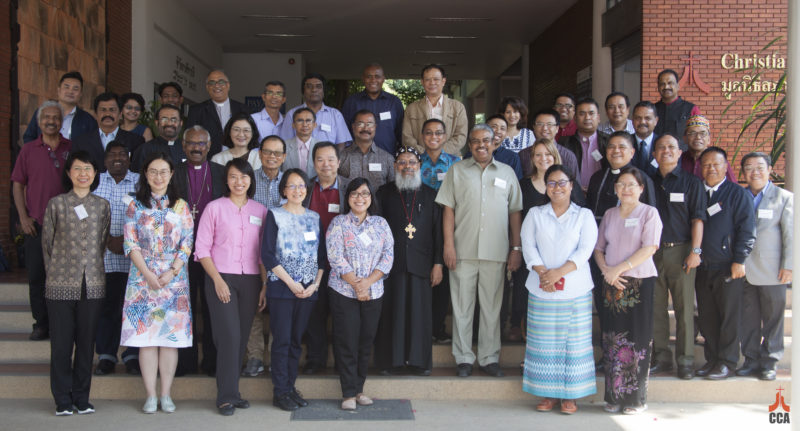WCC-CCA Consultation discusses ‘Evangelism and Missional Witness in a Multi-religious Asia’

CHIANG MAI, Thailand: An international consultation on ‘Evangelism and Missional Witness in a Multi-religious Asia’ being organized jointly by the World Council of Churches (WCC), and the Christian Conference of Asia (CCA) started with analyzing the emerging trends in evangelism and mission in Asia’s multi-religious contexts.
The discussions of the first part of the week-long deliberations was summarized as, “at a time when all religious communities are being reshaped by new encounters and relationships, the meaning and relevance of evangelism need to be rediscovered. Persistent plurality moves Christian communities to seek new and adequate ways to understand and relate to peoples of different religious traditions”.
Forty participants - an inter-generational and diverse group of missiologists, evangelists, young pastors, theological educators, and ecclesiastical leaders representing member churches and councils of WCC and CCA as well as representatives of the Federation of Asian Bishops’ Conferences (FABC) and the Asian Evangelical Alliance (AEA) are attending the consultation being held at the CCA Headquarters in Chiang Mai, Thailand from 29 November to 5 December 2019.
Dr Mathews George Chunakara, General Secretary of CCA stated at the opening session of the consultation, “Churches and para-church groups, as well as their related mission and evangelism projects, compete vehemently with each other in Asia in the name of propagating ‘gospel to the unreached’. When they make exclusive claims in the name of the gospel, such claims when shared and taken for granted, need deeper exegetical studies”.
“It is in this context that the consultation is expected to provide space for constructive dialogue on the challenges, possibilities, and potential for cooperation among churches and networks in different Asian contexts with regard to evangelism and missional witness in a multi-religious Asia”, added CCA General Secretary.
Kyriaki Avtzi, WCC’s Programme Executive for Evangelism in Unity, outlined the initiatives undertaken since 2012 within a wider global process and implemented earlier in the contexts of Europe, North America, and Africa.
The fourth regional consultation organsied in partnership with CCA is expected to address concerns pertaining to the multi-religious Asian context, and “this will be an opportunity to examine how the good news is shared in the multi-religious context of Asia where evangelism can be both a dividing as well as uniting factor”, added Ms. Kyriaki, an Orthodox woman theologian from Greece working at WCC’s headquarters in Geneva.
The first thematic address of the consultation by Bishop Dr Daniel Thiagarajah of Sri Lanka explained the context for the study of evangelism and missional witness in multi-religious Asia as one that is “significantly conditioned by the unintended consequences to God’s intention for shalom by the legacy of our missionary inheritance.”
Bishop Thiagarajah, a former Mission and Evangelism executive secretary of CCA raised a sharp critique saying “international mission partners cannot divorce themselves from the legacy of harm with which their forebears have burdened several Asian contexts.”
Sharing his experiences of working in a war-torn Sri Lanka, and the ongoing divisive practices of certain overseas mission partners in his ecclesiastical jurisdiction, Bishop Thiagarajah said, “What is missing in our evangelism and missional witness to God’s shalom today is a deep understanding of the severity of sin and its destructive, life-destroying, death-dealing effects.”
The starting point for addressing evangelism and missional witness in multi-religious Asia was to address the relationship between those who are harmed and their enemies, added Bishop Thiagarajah.
Three thematic presentations set the framework for dialogue in the consultation from different regions across Asia while participants make presentations outlining the existing situation of evangelism and mission in their respective contexts.
Evangelism and missional witness in local contexts in Asia were presented on the first day by Ven Perry Brohier of the Diocese of Colombo, Church of Ceylon (CoC); Dr. Lily Kadoe, Myanmar Institute of Theology (MIT), Rev Makato Kato, United Church of Christ in Japan (UCCJ); Rev Joseph Deva Komar, Seminari Theoloji Malaysia (STM); Rev Julius Caesar Barrameda, Iglesia Filipina Independiente in the Philippines (IFI); and Rev Dr Pradit Takerngrangsarit, Chruch of Christ in Thailand (CCT).
The week-long consultation is aimed at exploring the ways in which theological affirmations, education, and training programmes on evangelism have been placed in the diverse landscape of Asia; understand and reflect on the methodologies and strategies evolved by churches in Asia at local levels; and provide a platform to learn mutually from the experiences of Asian churches and their innovative evangelistic approaches and engagement in participating in God’s mission.










